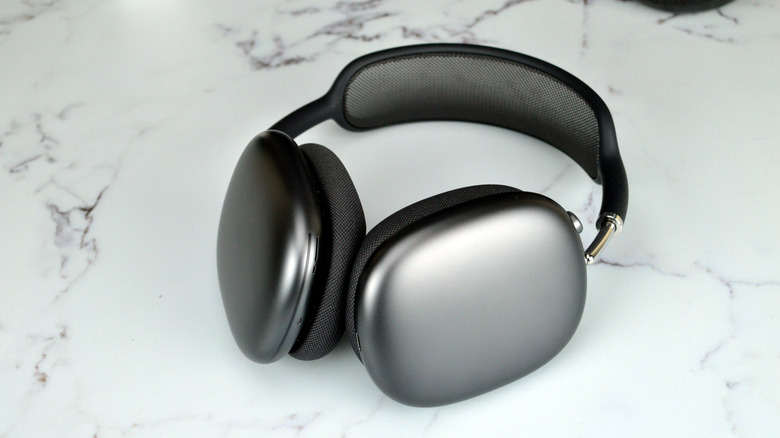Apple AirPods Max Headphones Review: Excellent And Expensive
After Apple purchased Beats Electronics in 2014, many assumed that Apple would soon roll Beats into Apple itself, and simply release Apple-branded headphones. Seven years later, Beats-branded headphones continue to release. But Apple is also leaning into its own audio products, most notably through the AirPods brand. The most recent product in that line are the AirPods Max headphones.
The AirPods Max arguably represent the culmination of Apple's headphone journey. They're by far the most expensive AirPods to date, and they're more expensive than anything in Beats' current lineup. But they're also aimed at delivering a premium, high-end experience that makes them worth the cost.
Given how competitive high-end noise-canceling headphones are, do the AirPods Max achieve this? I've been using them for a while now to find out.
AirPods Max design
The AirPods Max look like headphones, to be sure, but they look unlike any other headphones you've probably seen before. Somehow, the headphones offer a design that's both retro and modern at the same time, and there's a lot of attention to detail that you would expect from an Apple product.
The ear cups themselves are built from one piece of aluminum each, featuring a large, empty face on the side, and a relatively thin build. You won't find an Apple logo or touch surface here — the headphones are clean and minimalistic. While the face of the ear cups is relatively bare, however, the edges of the ear cups have a ton of slots and holes for microphones and controls.
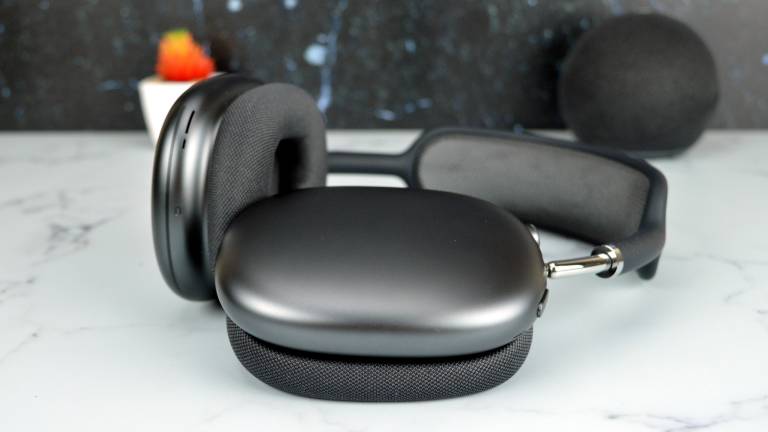
On the right ear cups is where you'll find the controls and ports. On the top of the ear cup, you'll find a button to toggle between different noise-canceling modes, and a Digital Crown for volume. The crown can also be pressed once to play and pause, twice to skip to the next track, and three times to skip back. It's relatively intuitive.
On the bottom of the right ear cup is where you'll find the Lightning port. That's right folks, there's no USB-C port here. And, to make matters worse, you'll have to use the Lightning port for wired listening too. That really only works with Apple's first-party adapter, considering it requires two-way data transfer. Really, for a pair of headphones in this price range, you should get an aux port — plus that would help allow the headphones to work with Apple's new lossless audio feature.
The headband is a distinctly Apple-y design too. Apple has foregone the use of padding, in favor of a mesh that stretches on the top of your head to help better distribute the weight of the headphones. That's helpful, because the headphones aren't light — at 13.6 ounces, they're far heavier than most other headphones.
On the ends of the headband, you'll get telescoping arms that extend and retract the ear ups to the desired size. This feature felt very nice, and they never extended or retracted without me wanting them to. It's a nice touch, but at times the ear cups can seem a little too close together when they're not on your head. With the cups rotated sideways, they can clank together a little, which can be scary on a pair of $550 headphones. It wouldn't be hard to imagine this wearing the paint a little after a while.
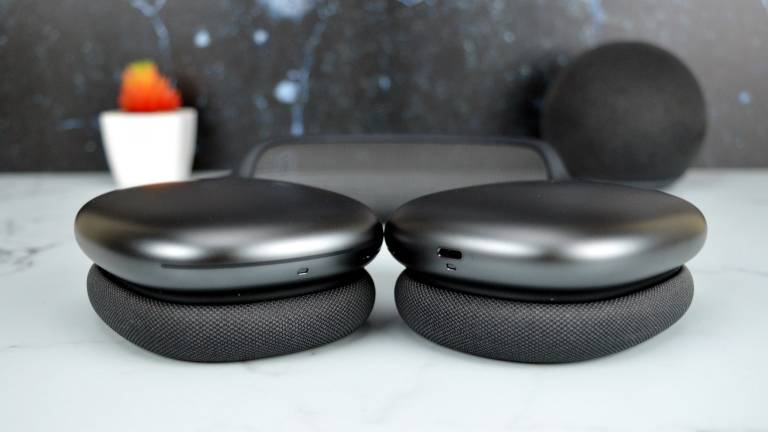
Speaking of paint, the headphones are available in a range of different colors. We're reviewing the Space Gray model, but they also come in Silver, Green, Sky Blue, and Pink. I'm a big fan of this more colorful Apple, despite the fact that I ended up going for the boring color.
The earpads are also removable, and they attach magnetically and can very easily be taken off. This is an awesome feature. It means that down the line, as they wear out, you can quickly and easily swap them out. It also means that you can mix and match colors. Unfortunately, replacements are a little expensive at $69, but there are third-party options out there.
Then there's the case. Ah, the case. Let me get this out of the way — the design of the AirPods Max's case is a bit ridiculous. It's hard to use properly, it's required to immediately put the headphones into a low power state, and it doesn't even properly protect the headphones. Frankly, I had to force myself to use the case to test its quality, and I found myself browsing Amazon for a third-party option. That's despite the fact that the case is clearly built from high-quality materials. Hopefully Apple learns its lesson here, and gives its next over-ear headphones something a little more useful.
But despite the crazy case, the lack of USB-C, and the lack of aux port, the headphones are still stunningly built. They're immediately recognizable, clearly made from premium materials, and generally look great.
AirPods Max features and battery
As you would expect from a modern Apple device, the AirPods Max headphones go much further than just connecting to your device wirelessly. They integrate way into your Apple ecosystem of products, and do so pretty much seamlessly.
For starters, the headphones offer Apple's Automatic Switching feature, which basically means that once you pair them to one of your devices, they'll pair with all of them. Put them on and play something on your Mac, and they'll connect to your Mac. Get a call on your iPhone, and they'll switch over. It works incredibly well.
They're good at knowing when not to play at all too. The AirPods Max offer ear detection tech that they can use to automatically pause and play audio. I often use speakers when I'm at my Mac, and occasionally switch between speakers and headphones throughout the day — and the Mac was smart enough to automatically switch over to using the speakers just by me taking the AirPods Max off. It's an awesome system.
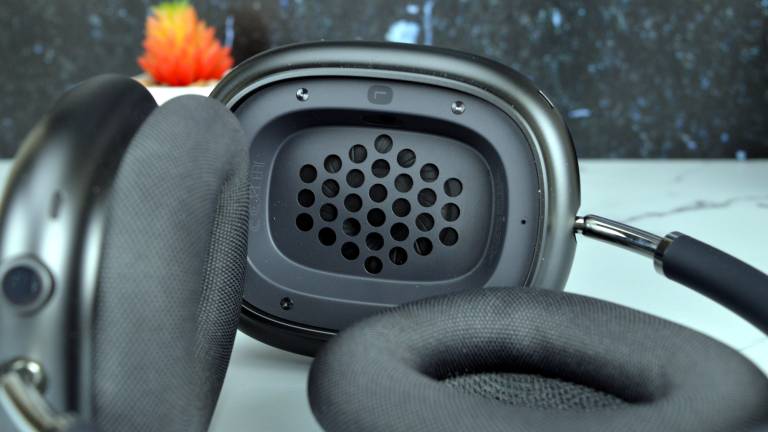
Next up is Spatial Audio, and frankly, it's really cool. I was a little skeptical about Spatial Audio in general when it was announced. After all, plenty of others have created virtual surround sound setups. But Spatial Audio works great, and sounds better. At times, it actually feels like you're in a theater. Apple announced that Spatial Audio is coming to the Apple TV too, when tvOS 15 is released in the fall. I can't wait.
Spatial Audio also works with music, and while it's cool at times, it can be a little hit-or-miss. Some like the extra space that the tech brings. It's worth experimenting with, but don't buy the AirPods Max for Spatial Audio on Apple Music.
The AirPods Max are packed with features, and that's not even to mention the noise cancelation tech, which we'll get into a little later. That's kind of what sets these headphones apart from other premium noise-canceling cans — the excellent integration with all of your Apple products. They'll integrate even better when iOS 15 launches, when the AirPods Max will get support for the Find My app.
The battery life on the AirPods Max is also pretty solid, though it is impacted a little by the fact that the headphones don't turn on and off the same way traditional wireless headphones do. To extend the battery life, you can place them in the case when you're not using them, but that's a little annoying. If you do use your headphones for a few hours per day, you should expect to be able to get at least three or four days of use out of them. Officially, Apple says you'll get 20 hours of use out of the headphones, which is fine, but not incredible.
AirPods Max comfort
The AirPods Max headphones are certainly heavier than other headphones, and that plays into how comfortable they are. For example, the Sony WH-1000XM4 headphones come in at only around 9oz, which is far less than the AirPods Max.
Thankfully, however, they don't feel overly heavy. The mesh headband is built to help evenly distribute the weight of the headphones across the top of your head. It works pretty well. They don't feel like they're applying a lot of pressure on the top of your head. That ensures that you can wear them for a matter of hours without getting uncomfortable.
The earcups have plenty of padding too. The clamp on these headphones isn't too tight, but it's still tight enough to create a seal for the noise cancellation. The headphones can get a little warm at times, but it's not too bad. You won't use these headphones for things like running or working out anyway.
Generally speaking, the AirPods Max headphones are comfortable enough for most use-cases. They're not the most lightweight headphones out there. But, Apple has done a good job at mitigating the issues that might arise from a heavy pair of headphones.
AirPods Max sound quality
Usually, the most important aspect of a pair of headphones is how they sound. With Apple-built headphones, it tends to be more about the package as a whole and how it fits into Apple's ecosystem. But sound quality is still important. Thankfully, the AirPods Max sound great. They're not the most natural-sounding headphones out there, but as long as you don't expect that, you'll love how they do sound.
The bass response on offer by the AirPods Max is tight and defined. Bass extension is relatively deep, meaning the headphones can reproduce some of the lowest lows. While there's certainly a bump in bass response, it doesn't venture into being muddy.
The mid-range is well-tuned, with a generally flat response. There's a slight dip in some of the high mid frequencies, but generally speaking, the headphones don't venture too far into that "scooped" frequency response that you can find from many consumer headphones, including those from Apple's Beats brand.
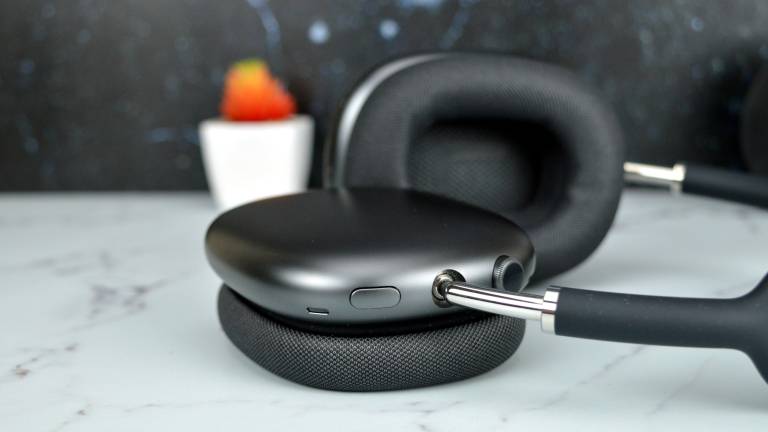
Perhaps the best part of how these headphones sound is in the high end. The highs are detailed, crisp, and accurate. The highs don't get too harsh, but they do help contribute to a generally very detailed experience overall. The headphones also have a nice, wide soundstage, which helps make them more immersive and interesting to listen to.
The noise cancelation on offer by the AirPods Max is excellent, and among the best of any noise-canceling headphones. The AirPods Max feature nine microphones dotted around the exterior, eight of which are used for noise cancellation. All these microphones pay off, and the headphones are great at cutting out any outside noise.
They also offer an awesome transparency mode, and again, it's among the best I've heard. Transparency mode allows you to hear your surroundings, including voices. That means you can have a conversation without having to take your headphones off. It's easy to switch modes with the button on the headphones, or the settings on your phone or Mac.
AirPods Max review conclusions
The AirPods Max are a distinctly Apple take on noise-canceling headphones. They're not perfect by any means, but they look good, sound great, and offer all the features you would want from a product in the Apple ecosystem, including some features that will roll out later this year alongside iOS 15 and tvOS 15.
Then there's the price. $550 is not cheap, and it's more expensive than competing products from Sony and Bose. But that's what happens when you buy the Apple ecosystem — you get premium features at a premium price. If you're willing to pay the money, you'll get a pair of incredible headphones.
The competition
Of course, if integration with Apple devices isn't all that important to you, then there are other, arguably better options, at least for the price. Easily the best alternative are the Sony WH-1000XM4 headphones, which are class-leading noise-canceling headphones that come at $350. If you're an Android user, or even a cross-platform user, don't spend the cash on the AirPods Max. Instead, buy the Sony headphones. They still support two Bluetooth connections, a range of smart features through the Sony app, and a lightweight, comfortable fit.
Are the AirPods Max worth buying?
It depends. If you're deep in the Apple ecosystem, and want a pair of over-ear headphones that will integrate with your other Apple products, you're going to love the AirPods Max. But if you just want a pair of great noise-canceling headphones, it's worth saving your cash and going for the Sony WH-1000XM4 headphones instead.
